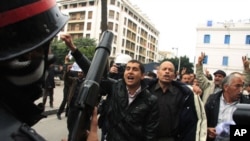A program manager at the Center on Democracy, Development and the Rule of Law at California’s Stanford University told VOA many Tunisians see the ongoing crisis as an opportunity to make a fresh start towards democracy after years of dictatorship.
Lina Khatib, manager of the Program on Good Governance and Political Reform in the Arab World said protesters want a government that will be equally representative and protect the interests of the ordinary Tunisian.
This came after at least three ministers announced they were resigning from Tunisia's day-old coalition government. Officials with the country's main labor union (the UGTT) said the three ministers were withdrawing because the union had decided it will not recognize the new government.
“The rationale behind keeping members of the Constitutional Democratic Rally (RCD) was given by (Prime Minister) Mohamed Ghannouchi and his supporters as trying to present a situation (as) to what happened in Iraq, whereby there was a complete power vacuum, which led to chaos. So, they said this is a unity government, which means everybody should be represented, including members of the RCD party,” said Khatib.
“They also said those people who stayed in the government had clean hands. However, that was controversial; for example, the interior minister who has been appointed by (former) President Ben Ali to (stop) the demonstrators retained his post as the Interior Minister, and this was seen as a provocation.”
State media reports say the country's interim president and prime minister have resigned from the ruling party. President Fouad Mebazza and Prime Minister Mohamed Ghannouchi quit the Democratic Constitutional Rally party, but will retain their posts in running the country.
Analysts say the resignations may be an effort to end days of protests by demonstrators who have called for a complete eradication of the old ruling party.
Khatib said the country’s opposition seems split and unsure about its next line of action.
“For a lot of Tunisians, this is a moment to start again, to start from almost zero, to start with a democratic government that represents those voices from the opposition that had been denied in Tunisia before,” said Khatib.
“However, what we see on the ground is that the opposition itself is divided. So, some protesters, for example the leader of the Union of Freedom and Labor who was named as Health Minister, Mustapha Ben Jaafar, was named (as) House Minister, but refused to take office.
At the same time, we have people like Najib Chebbi, who is from another opposition party called the Progressive Democratic Party, named as Development Minister, has stayed on in his position.”












